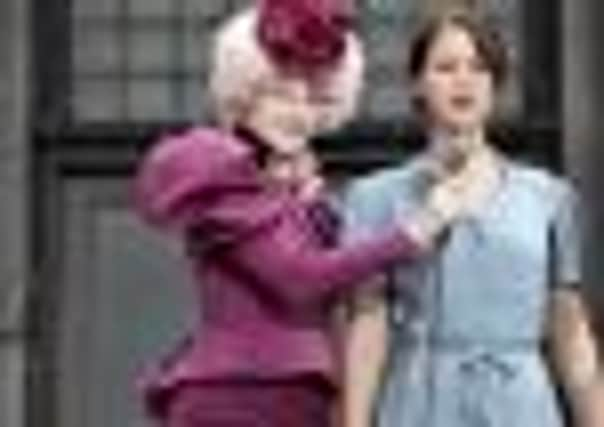Film review: The Hunger Games


Based on the first instalment of Suzanne Collins’ bestselling dystopian fantasy trilogy for teenagers, The Hunger Games is one of the more curious films fixing to plug the gap left by the Harry Potter franchise and the imminent conclusion of the Twilight saga. On the one hand, its murderous, Battle Royale-cribbing premise – featuring marauding teens fighting each other to the death on a reality game show – makes it a far edgier cinematic proposition than either of those blockbusting series. On the other, its prestigious production values and self-possessed heroine (played by Jennifer Lawrence) work up an appetite for the sort of meaty sci-fi film its illogical plotting, tween-friendly rating and derivative allegorical overtones can’t quite nourish.
That’s too bad, because even though it’s slightly depressing that we seem to have entered into a Fahrenheit 451-esque age where comic books and easy-to-read young adult novels have more cultural currency than serious literature (40 years ago Stanley Kubrick’s version of A Clockwork Orange was the world’s most hyped dystopian film; now it’s this), The Hunger Games at least seems to be attempting to punch above its weight as a movie. That’s perhaps not saying much given the bar-lowering dominance of Twilight in recent years. Nevertheless, there’s is something very appealing about the film’s 16-year-old heroine, Katniss Everdene, especially since her hardscrabble existence is a world away from the sullen romantic musings of Bella Swan. Doubtless cast for the role’s superficial similarity to the tough, no-nonsense, squirrel-roasting protagonist she played in Winter’s Bone, Jennifer Lawrence lends Katniss the kind of gravitas that, initially at least, makes the film’s bleak vision of the future seem credible.
Advertisement
Hide AdThat future takes place in a dictatorship known as Panem, a renamed version of America in which the decadent denizens of the capital city of, ahem, Capitol, lord over the poverty stricken masses occupying the 12 numbered districts that make up the rest of the country. The starving, over-worked inhabitants of these districts toil away to supply Capitol’s citizenry with everything they need; in turn, they’re kept in line by an annual reality show in which a boy and a girl from each district are randomly selected to compete in a televised battle to the death. The game itself has been devised as a punishment for an earlier failed rebellion in the districts, although quite why being forced to watch their kids fight to the death on television year-in, year-out hasn’t sparked multiple lawless uprisings since is never really addressed.
Indeed, that conceptual flaw is one the film would rather you didn’t deliberate over too much as it whisks Katniss (who has volunteered to participate in the games in order to spare her younger sister) and her District 12 counterpart Peeta (played by Josh Hutcherson) off to Capitol to be primed, primped and polished for their TV debuts. Here director Gary Ross – who made the sly 1950s-set suburban satire Pleasantville a number of years ago – starts excavating the story’s rote apocalyptic themes by showing how the contestants (known as Tributes) are trained as much in the ways of media manipulation as they are in mortal combat.
The trouble with the film, however, is not so much the heard-it-all-before allegorical content, it’s that after taking care to set up this world, The Hunger Games fails to follow through on the main event in a satisfying way. That’s partly down to the limitations of its 12A certificate, which means the horror of the titular kill-crazy contest can’t be fully realised. To get round this, Ross uses handheld cameras to keep Katniss and Peeta in tight focus, which seems like an elegant solution at first (the opening slaying is impressively visceral), but it also makes the 22 other contestants fighting for survival seem even more anonymous and inconsequential. That’s a problem because at one point early on in the game, a group of Tributes team up with the most bloodthirsty member to hunt Katniss – another conceptual flaw that makes no sense given that a) they’ve all been primed to hunt and kill each other and b) nothing in the script suggests they should do otherwise.
Indeed characters are forever coming to each other’s rescue for the most specious of reasons, and other subplots – an ambiguous love triangle, rioting in the districts – seem similarly contrived. It’s as if the film’s makers have decided that because it features a game show in which reality can be manipulated, they can simply use this as a device to get the film out of trouble every time it backs the characters into a narrative corner.
Unfortunately this makes Katniss’s quest for survival increasingly dull at the very moment it should be at its most exciting. As it meanders towards its inevitable sequel set-up, The Hunger Games leaves you wanting more – just not in the way that it should.
THE HUNGER GAMES (12A) ***
Directed by: GARY ROSS
Starring: JENNIFER LAWRENCE, JOSH HUTCHERSON, STANLEY TUCCI, ELIZABETH BANKS, WES BENTLEY
DID YOU KNOW?
The Hunger Games’ author Suzanne Collins was inspired to create the book’s dystopia while channel surfing between reality shows and coverage of the invasion of Iraq.